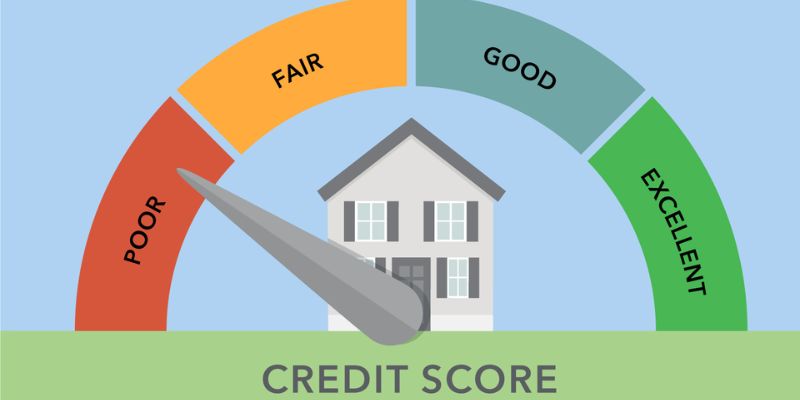The Ideal Credit Score to Buy a House
Oct 28, 2023 By Susan Kelly
Do you want to buy a house but need to know the required credit score? Knowing your credit score and how it affects your ability to get a mortgage can be overwhelming and confusing - especially if you're unfamiliar with the industry.
But understanding your credit reports and scores is essential for success when you set out to buy a home. This blog post will outline everything you need to know about having an ideal credit score when submitting a loan application, plus provide tips for improving your chances of securing financing.
Keep reading to learn more about the importance of having good credit to purchase real estate!
What is an Ideal Credit Score

The ideal credit score can vary depending on the scoring model used, but generally, a higher credit score indicates better creditworthiness and can provide access to more favorable loan terms and interest rates.
The most popular credit rating technique is the FICO score, which has a range of 300 to 850. Although specific lenders may have different requirements, the following is a general breakdown of credit score ranges:
Poor credit
A score below 580 is generally considered poor credit. It may indicate a history of late payments, high levels of debt, or significant credit issues. Borrowers with poor credit may need help to obtain loans or be subject to higher interest rates and less favorable terms.
Fair credit
Scores between 580 and 669 are typically considered fair credit. While borrowers in this range may qualify for loans, they may still need help obtaining competitive interest rates or favorable terms.
Good credit
Scores between 670 and 739 are considered good credit. Borrowers in this range generally have a solid credit history with a lower risk profile. They are more likely to qualify for loans and can access better interest rates and loan terms.
Very good credit
Scores between 740 and 799 are considered very good credit. Borrowers in this range are viewed as low-risk borrowers and are likely to qualify for loans with excellent terms, including lower interest rates and more favorable conditions.
Excellent credit
A score of 800 or above is generally considered excellent credit. Borrowers in this range have an exceptional credit history, demonstrating responsible financial management. They will likely have access to the most favorable loan terms, the lowest interest rates, and a wide range of credit options.
It's important to note that different lenders may have credit score requirements and lending criteria. Credit scores are just one-factor lenders consider, who also evaluate income, employment history, debt-to-income ratio, and other factors when determining loan eligibility.
What Credit Score Do I Need to Get a Mortgage
The credit score needed to qualify for a mortgage can vary depending on the type of mortgage loan and the lender's requirements. Different lenders have different credit score thresholds, and they may also consider additional factors such as your income, employment history, and debt-to-income ratio.
However, here's a general guideline for the credit score ranges typically associated with mortgage qualification:
Conventional Loans
- Conventional loans are not insured or guaranteed by a government agency like FHA or VA.
- A minimum credit score of around 620-640 is often required to qualify for a conventional mortgage.
- A higher credit score, typically 680 or above, is preferable to obtain more favorable interest rates and terms.
FHA Loans
- The Federal Housing Administration backs FHA loans and has more flexible credit requirements.
- Generally, a minimum credit score of 500-580 is required for an FHA loan.
- However, a higher credit score, typically 580 or above, may be required to qualify for the low down payment option (3.5% down).
VA Loans
- VA loans are available to eligible military service members, veterans, and spouses.
- The Department of Veterans Affairs (VA) sets no specific credit score requirement, but lenders typically require a minimum credit score of around 620-640.
- VA loans offer more lenient credit guidelines compared to conventional loans.
USDA Loans
- USDA loans are designed for low- to moderate-income borrowers in rural areas.
- Although the USDA does not specify a minimum credit score, lenders normally require a score of 640 or above.
- USDA loans consider factors beyond the credit score, such as repayment history and income stability.
What is the minimum credit score requirement to buy a house
The minimum credit score requirement to buy a house varies depending on the type of mortgage loan and the lender's requirements.
Generally, conventional loans require a minimum credit score of 620-640, while FHA and VA loans require a minimum credit score of 500-580. USDA loans typically require a minimum credit score of 640.
It's important to remember that these are general guidelines and that lenders may have their specific requirements. It's best to consult multiple lenders for more information about their credit score requirements and find the best mortgage option based on your financial situation.
Average credit scores of homebuyers

The average credit scores of homebuyers can vary depending on various factors, including the location, market conditions, and the specific demographic group being considered. While it's challenging to provide an exact average credit score for all homebuyers, here are some general observations:
FICO Scores
Lenders commonly use the FICO credit scoring model to assess creditworthiness. FICO scores range from 300 to 850, with higher scores indicating better creditworthiness. According to a report by the Federal Reserve, the median FICO score for closed mortgage loans in the United States was 752 as of 2020.
First-Time Homebuyers
First-time homebuyers often have slightly lower credit scores compared to repeat buyers. According to a study by the National Association of Realtors (NAR), the median credit score for first-time homebuyers in the United States was 734 in 2020.
Different Loan Programs
The credit score requirements can vary depending on the type of loan program. For example, FHA loans, popular among first-time homebuyers, tend to have more lenient credit requirements. The median credit score for FHA borrowers was around 670 in 2020, according to the FHA's Annual Report to Congress.
Regional Differences
Credit scores can also vary by region. Economic conditions, housing market trends, and demographic characteristics can influence credit scores. It's important to consider regional data or consult with local lenders to better understand average credit scores for homebuyers in a specific area.
FAQs
Which credit score is most accurate to buy a house?
The most accurate credit score to buy a house is the FICO Score of 8. The FICO Score 8 is the latest version of the FICO Score and is used by hundreds of lenders across the US. It considers factors such as payment history, amounts owed, and when accounts have been opened when determining your credit score.
How much can you borrow with a 700 credit score?
Generally speaking, if you have a credit score of 700 or higher, you can borrow up to $400,000 depending on other factors, such as your debt-to-income ratio.
Is 750 a good credit score?
Yes, a credit score of 750 is considered very good. It is in the upper range, and lenders will likely provide you with more attractive borrowing terms, such as lower interest rates, than those with lower credit scores.
Conclusion
Buying a house involves various steps, including having the right credit score. The good news is that there are methods you can use to repair your credit score and reach figures suitable for submitting a loan application if your score falls short.
So why wait? To learn more about the importance of having an ideal credit score when buying a house, visit our website today! Adopting an informed approach and knowing FICO scores could be just what you need to realize the goal of owning a home.

Dec 16, 2023 Triston Martin

May 20, 2024 Triston Martin

Nov 19, 2023 Susan Kelly

Dec 14, 2024 Elva Flynn

Nov 26, 2024 Darnell Malan

Oct 29, 2023 Triston Martin
